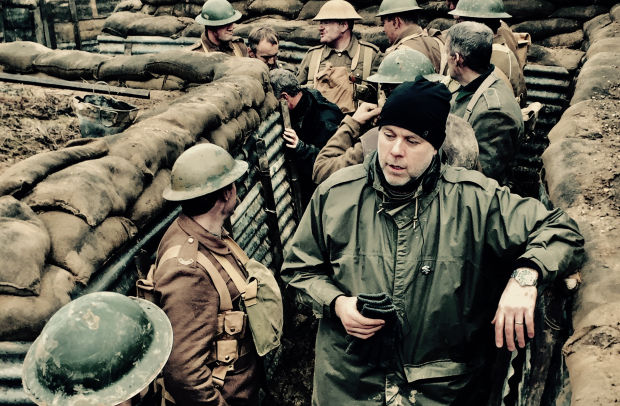
“It’s Always Good to Be Bold”

Saul Dibb’s career started with ten years of making documentaries before he moved on to directing critically acclaimed and award-winning films such as Suite Francaise, The Duchess and Journey’s End. Later this year, his much-anticipated TV show Dublin Murders is being released. Here, he discusses the way he seamlessly transitions between commercial, film and TV, and how he approaches all his work with the same guiding principles.
Q> Where did you grow up and what kind of kid were you?
Saul> I grew up in Barnes in South West London. I think I was known, or at least my parents told me, to be pretty cheeky. My parents were into Doctor Spock and the idea of children’s free expression but perhaps they took that too far. I was massively into Leeds United, so football was a big thing for me as a kid growing up too.
Q> Dublin Murders is the first TV series you’ve done after a long stint making films, were you excited to do a TV project?
Saul> The bar for international television has been raised so high and the boundary between film and television has been eroded, so for me, it’s about making things at that level. Television hasn’t always been given the time and money to do that historically, so it’s an exciting time.
I pitched that each hour of Dublin Murders would be a mini movie. Then once I got the go ahead I had to make sure that happened!
Q> What did you do to ensure that you delivered?
Saul> For me, realising the ambition and the scale, the quality of the acting and the quality of the cinematography are primarily what achieve that. Benjamin Kracun, who’s fantastic and had just shot Beast, came on as DP and really helped get the cinematic look I was after.
In some ways storytelling in television has slowed down and it now gets deeper into the characters. At the same time I think the visual element of that storytelling has been given much more emphasis and is recognised as being of equal important as the writing (as opposed to film, where it’s always been that way).
So Sarah Phelps, who has written Dublin Murders, creates brilliant scenes and dialogue but also deliberately made space for extended visual sequences – some of which can last for nearly ten minutes – without a word of dialogue being spoken. That’s bold, and was a real attraction for me as a director. It’s always good to be bold!
Q> What’s most important to you when directing, and what are the challenges?
Saul> To me the plot is interesting to an extent, but it’s also there as a device to draw you in to what really matters, which is an exploration of the characters. That’s what I really care about. People and why they behave in the ways they do.
One of the greatest things about Dublin Murders was getting to choose a brilliant set of Irish actors and then going with them on a very dark psychological investigation into their characters. We cast everyone from Ireland and didn’t have to compromise on this at all so it had a real authenticity to it. And it wasn’t hard to find them because they have such an amazing pool of talented performers.
Q> How do you prepare for TV vs films vs commercials, is your process different?
Saul> It’s always the same really. You’re always trying to get into the shoes of your main characters and see the world from their perspective. So I don’t have a fundamentally different approach between a documentary, commercial, film or television. Obviously the form changes, and you are telling a story with a different time scale, but I come at it from the same angle and the ambition has always got to be the same.
I think there were always slightly false distinctions between film and TV, and they have become even less relevant. TV has elevated its game, and in lots of ways is bolder and more challenging and interesting than lots of films which can often be very conservative in form and content.
Q> Journey's End got such a great response, was it an enjoyable film to make?
Saul> Journey's End was probably the most enjoyable film I have made. It was a brilliant script and a brilliant set of actors, and it was a really creative process. It doesn’t always happen that you go out and make a film in the way you want to make it and everyone appreciates it the way you wanted them to appreciate it. But it did here.
Q> Bullet Boy was the first film you made, how did that experience compare?
Saul> I look back at Bullet Boy with lot of affection, although it was my first film so I was under an enormous amount of pressure not to cock it up. In lots of ways it was a good experience, I was given a lot of support - as you would hope a lot of first-time filmmakers would be given - and it made a lasting cultural impact in a way I think none of us involved could have hoped for. Even recently Daniel Kaluuya said in a pre-Oscars interview that it was watching Ashley Walters in Bullet Boy that gave him the confidence to think there would be a space for young Black actors in British films. That made me really happy.
Q> You have a great talent for storytelling and narrative work, what scripts / ad campaigns would you enjoy working on the most?
Saul> I feel most comfortable with things that have strong narratives that relate to a very real-feeling world, with powerful performances at their centre; whether these are from people who have never acted before - which is a very rewarding thing to direct - or brilliant performers at the top of their game.
I like to capture things that have truthful moments. Within advertising I think it’s possible to have all these things. It’s possible to have ads that are brilliantly acted, brilliantly observed, brilliantly cast, that can distil something in 30 seconds.
Advertising has kept itself fresh through experimentation. It’s about finding a different way to tell stories and ideas. Its campaigns that have some kind of edge to them which interest me. In Britain we are so lucky to have some of those campaigns, and they are the ones I’m looking for.
The through line between all my work is having a strong relationship to reality - which I started off with making documentaries and have continued to develop in fiction. I don’t rule out anything, my guiding principle is: is it interesting, can I bring something to it that is particular to me?













